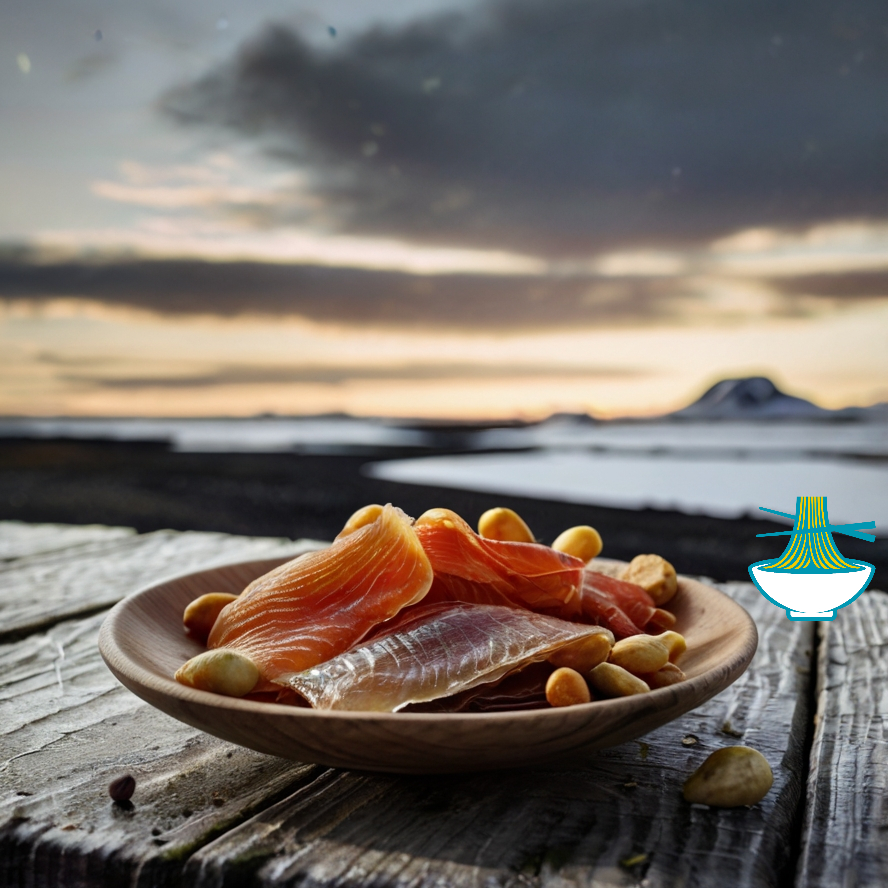Discover the traditional Icelandic snack, Harðfiskur, a beloved delicacy made from dried fish. Learn about the unique process of drying fish in Iceland's crisp air, creating a savory, protein-rich treat with a satisfyingly chewy texture. Perfect for adventurous foodies looking to experience authentic Icelandic cuisine.
Here's a simple recipe to make Harðfiskur, Icelandic dried fish, at home:
Ingredients:
- 500g white fish fillets (such as cod, haddock, or pollock)
- 1 liter water
- 100g salt
Instructions:
Prepare the Fish:
1- Start by filleting the fish and removing the skin.
2- Cut the fillets into thin strips, about 1 inch wide.
Brine the Fish:
1- In a large bowl, mix the water and salt until the salt is completely dissolved.
2- Add the fish strips to the brine, making sure they are fully submerged.
3- Let the fish soak in the brine for about 1-2 hours. This step helps to preserve the fish and adds flavor.
Dry the Fish:
1- After brining, remove the fish strips from the brine and pat them dry with paper towels.
2- Hang the fish strips on a drying rack or string them up with a needle and thread, leaving space between each strip for air circulation.
Air Dry the Fish:
1- Hang the fish strips in a cool, dry, and well-ventilated area.
2- Let the fish dry for about 3-4 days, or until they are completely dry and hard to the touch. The drying time may vary depending on the humidity levels.
Store the Harðfiskur:
1- Once the fish is fully dried, store it in an airtight container or bag to maintain its freshness.
2- Harðfiskur can be enjoyed as a snack on its own or rehydrated by soaking it in water for a few minutes before eating.
Enjoy your homemade Icelandic Harðfiskur!
Nutritional Values:
Here are the approximate nutritional values for the ingredients used in the Harðfiskur recipe:
500g White Fish Fillets (Such as Cod, Haddock, or Pollock):
- Calories: About 500 kcal
- Fat: 5g
- Carbohydrates: 0g
- Protein: 100g
Benefits: High in protein and low in fat. Provides essential nutrients such as omega-3 fatty acids, vitamin B12, and selenium. Supports muscle growth, heart health, and overall well-being.
1 Liter Water:
- Calories: 0 kcal
- Fat: 0g
- Carbohydrates: 0g
- Protein: 0g
Benefits: Essential for hydration and for cooking. Helps to extract flavors and improve texture in recipes.
100g Salt:
- Calories: 0 kcal
- Fat: 0g
- Carbohydrates: 0g
- Protein: 0g
Benefits: Enhances flavor and acts as a preservative. Essential for electrolyte balance in the body, but should be used in moderation to manage sodium intake.
These values are approximate and can vary based on the specific type of fish and brand of salt used.


Comments